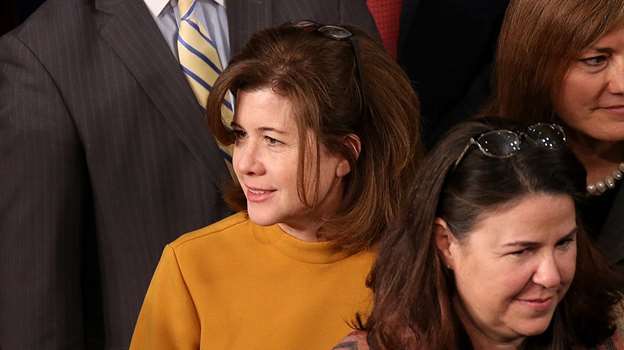
The Senate parliamentarian ruled Monday that Democrats can use special budgetary rules to avoid a GOP filibuster on two more pieces of legislation, setting the stage for President Biden‘s infrastructure agenda to pass in two packages with simple-majority votes.
It’s a win for Senate Majority Leader Charles Schumer (D-N.Y.) that allows him to pass Biden’s $2.25 trillion package by revising the fiscal 2021 Budget Resolution.
Schumer could pass a budget resolution for fiscal 2022 to do a third reconciliation package for the second half of the Biden infrastructure agenda. Or the fiscal 2021 budget could be revised a third time to set up a third reconciliation package.
Top Schumer aides had argued to parliamentarian Elizabeth MacDonough last month that Section 304 of the Congressional Budget Act of 1974 allows them to revise the budget resolution for fiscal 2021 to create additional reconciliation instructions, setting up pathways to pass two more bills this year with only a simple majority in the 50-50 Senate.
“The Parliamentarian has advised that a revised budget resolution may contain budget reconciliation instructions. This confirms the Leader’s interpretation of the Budget Act and allows Democrats additional tools to improve the lives of Americans if Republican obstruction continues,” a spokesperson for Schumer said in a statement Monday. “While no decisions have been made on a legislative path forward using Section 304 and some parameters still need to be worked out, the Parliamentarian’s opinion is an important step forward that this key pathway is available to Democrats if needed.”
Democrats used the budget reconciliation process earlier this year to pass Biden’s $1.9 trillion coronavirus relief bill without any GOP votes, instead of the 60 votes needed to advance legislation in the upper chamber.
The new ruling will enable Schumer and Speaker Nancy Pelosi (D-Calif.) to break up Biden’s infrastructure proposal into two legislative packages.
The first portion, a $2.25 trillion measure unveiled by the White House last month, includes more traditional infrastructure priorities. The second part, planned for later in the year, will include more people-focused spending priorities favored by progressives, such as expanded child care, free community college, universal prekindergarten and more affordable housing.
Both the Senate and House will need to pass another concurrent resolution to trigger an additional set of reconciliation instructions.
Democratic aides say a second infrastructure package will be needed if Biden’s $2.25 trillion proposal is scaled down in an effort to secure any Republican votes or lock down the support of Democratic centrists such as Sen. Joe Manchin (W.Va.).
A Schumer aide said last week that the majority leader “wants to maximize his options to allow Senate Democrats multiple pathways to advance President Biden’s Build Back Better agenda if Senate Republicans try to obstruct or water down a bipartisan agreement.”
Senate Finance Committee Chairman Ron Wyden (D-Ore.), who has jurisdiction of the tax legislation Democrats plan to pass to pay for part of Biden’s infrastructure agenda, applauded the parliamentarian’s decision Monday evening.
“I’m pleased by the parliamentarian’s ruling that budget resolutions can be revised, allowing us to consider moving additional bills through the reconciliation process. The American people want bold action to address our country’s many challenges, and Democrats now have more options to overcome Republican obstruction and get things done,” he said in a statement.
Senate Republicans argued that Democrats should not have been allowed to move two separate reconciliation packages, with special protections from a filibuster, from the same budget resolution.
“This is an abuse of the process and clearly not what reconciliation was designed to do, but they’re going to go forward anyway,” said one GOP aide.
The party in control of the White House, the House and the Senate often seeks to advance only one reconciliation package per fiscal year budget. During former President Trump’s first year in office, Republicans used a budget resolution in fiscal 2017 to advance legislation that would have repealed parts of the Affordable Care Act, followed by a budget resolution for fiscal 2018 to enact the Tax Cuts and Jobs Act.
Schumer used the first budget reconciliation package of fiscal 2021 to pass the $1.9 trillion American Rescue Plan in a 50-49 vote on March 6.
MacDonough dealt Democrats a setback on that bill by ruling in late February that they could not add a provision raising the federal minimum wage to $15 an hour, a provision Biden had included in his initial pandemic relief proposal.
Revising the 2021 budget resolution will require 15 hours of Senate floor debate and another budget vote-a-rama, which will burn up valuable time on the calendar.
“It’s 15 hours for the revision on the Senate floor. You still have to report, you still have to call it up, you still have to get to the floor, you still have a possibility of vote-a-rama,” said Bill Hoagland, a budget expert at the Bipartisan Policy Center. “I’m not quite sure in the big scheme of things you save much in the way of time.”
After revising the 2021 budget resolution, Democrats could then pass a resolution for fiscal 2022, setting up a third budget resolution to pass the second half of Biden’s infrastructure agenda and raise the federal debt limit by year’s end.
Congress has suspended the debt limit through July 2021, at which point the Treasury Department will begin to use “extraordinary measures” to extend the federal government’s borrowing authority for a few months, likely until the end of the year.
While Democrats could include multiple reconciliation instructions in the 2022 budget resolution to pass both halves of Biden’s infrastructure agenda and raise the debt limit, leaders may have other priorities in mind for that resolution.
Via The Hill


